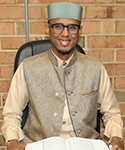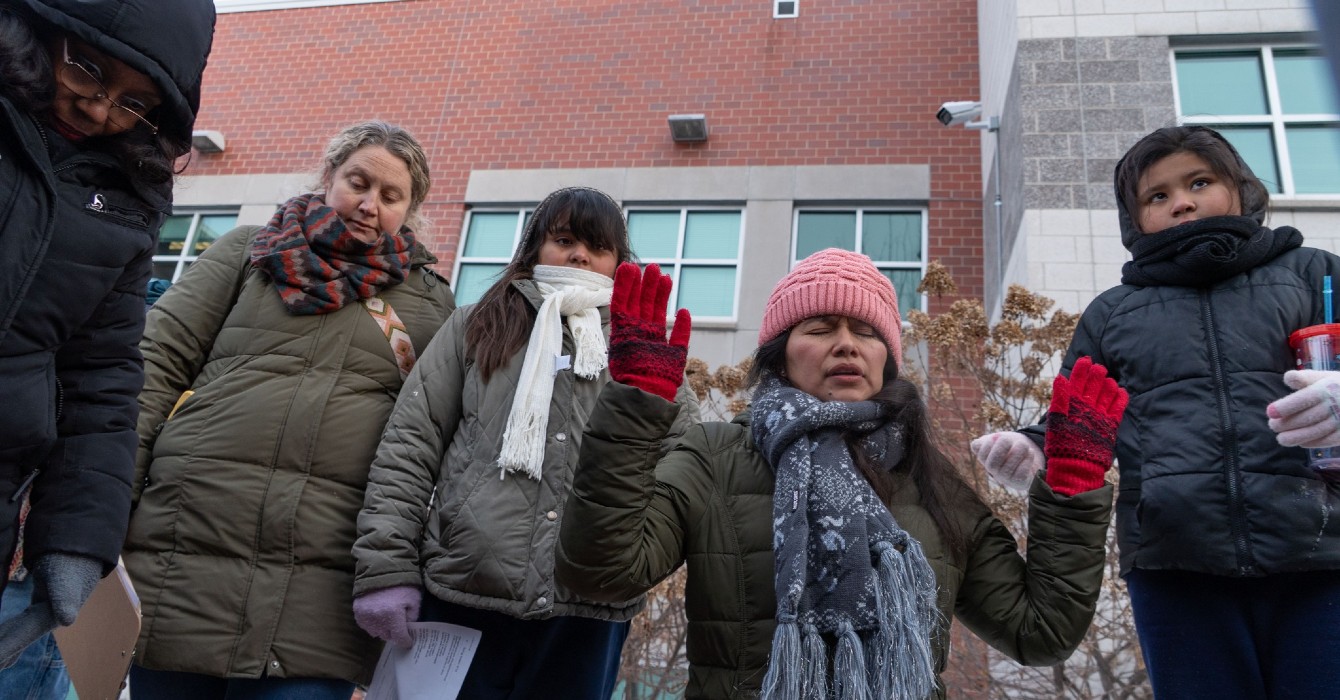Editor's note: Steven Sager died on May 15, 2022.
Since January 2018, Beth El Synagogue in Durham, North Carolina, has met at nearby Trinity Avenue Presbyterian Church while its building is being renovated. So when people across the country gathered for Solidarity Shabbat on Saturday, Nov. 3, 2018, one week after 11 people were killed in a mass shooting at the Tree of Life synagogue in Pittsburgh, the service in Durham offered a unique opportunity for the two congregations to build on their interfaith relationship.
For the Shabbat services, Beth El Rabbi Emeritus Steven Sager invited the Rev. Katie Crowe, Trinity Avenue Presbyterian’s senior pastor, and Imam Mowlid Khalif Ali, of Durham’s Jamaat Ibad Ar-Rahman, to speak to the congregation.
Contributors
Click a name to jump directly to that contributor's response.
• Rabbi Steven Sager
• The Rev. Katie Crowe
• Imam Mowlid Khalif Ali
The following are the three clergy members’ messages, reflecting on the section of the Torah read at the service. Crowe’s text is printed in its entirety; Sager’s and Ali’s are adapted from extemporaneous remarks they made that day.
 Rabbi Steven Sager
Rabbi Steven Sager
Director of the nonprofit Sicha and rabbi emeritus of Beth El Synagogue
We do not choose our tragic moments. Ours is the obligation of response, enlisting in our service the elements of tradition -- of mind and spirit -- available to us. The Torah portion awaiting us on this first Shabbat after the tragedy in Pittsburgh is Hayyei Sarah (Genesis 23:1-25:18). These are the Torah’s first available materials from which we summon the dignity of response.
The story begins with the death of Sarah and ends with the consent of Rebecca to leave her land, birthplace and father’s house to become the wife of Isaac. Abraham’s servant is the one who literally walks this story from Canaan to Mesopotamia, from its sad and urgent beginning to its successful end. He becomes a hero of prayer-joined-to-action when he lifts to prayer a plan that does not plead for the miraculous. It relies upon the continuation of the hesed -- the lovingkindness -- that has characterized the life of his master, Abraham. In this story, Abraham’s servant remains unnamed. He might bear my name, or yours. His prayer has a footing in the everyday world, because that prayer’s “feet” belong to one who hastens toward hesed, creating community, turning strangers into fellow travelers who respond to need with the lovingkindness that is drawn from the spring of the everyday.
When Sarah died at the age of 127, Abraham’s family lost its hesed, the caring, steadfast acts that connect people and sustain the world. Sarah’s hesed was unfailing, even in difficult times. “Let this be your hesed to me,” Abraham had once said to Sarah when he proposed how she might save him from threatening rulers by posing as his sister instead of his wife (Genesis 20:13).
Under the best of circumstances, a life as long as Sarah’s is a reminder of the difference between what is sad and what is tragic. But some say that Sarah died of a broken heart, for Abraham had lost his own hesed to a blinding revelation that he should sacrifice their son, Isaac. In that moment, he was no longer the exemplar of hesed he had been to hungry and tired strangers at the door, to kin held captive, to unknown residents of the violent cities of Sodom and Gomorrah.
With Sarah’s death, Abraham resolved to restore the hesed that he had once known and that Sarah had never abandoned. The new days, going forward, required the connectedness of the old days; they required the old family wellspring of hesed, the unending flow ready to be drawn up and shared.
Abraham’s servant found the very place where the metaphor and the water converged -- the wellspring marking his arrival in the home district of Abraham’s family in Aram-nahara’im. Here, where water was drawn and hesed was offered to strangers, the faithful servant became a master of prayer, an exemplar for all who would follow. He asked for hesed in his master’s name, as Abraham himself had once asked Sarah. He did not pray for a miraculous divine act but for a human act of hesed:
He made the camels kneel down by the well outside the city, at evening time, the time when women come out to draw water. And he said, “O Lord, God of my master Abraham, grant me good fortune this day, and act with hesed toward my master, Abraham: Here I stand by the spring as the daughters of the townsmen come out to draw water; let the maiden to whom I say, ‘Please, lower your jar that I may drink,’ and who replies, ‘Drink, and I will also water your camels’ -- let her be the one whom You have decreed for Your servant Isaac. Thereby shall I know that You have acted with hesed toward my master.”(Genesis 24:11-14 NJPS alt.)
Those were days of hesed, back when Sarah had stood at that spring -- days so necessary, and now so absent. Abraham’s servant drew the yearning for hesed into a prayer. The poet Yehuda Amichai drew that same yearning into a poem:
“Those were days of hesed,” I heard them say once
on a winter street during days of loneliness and pain.
Even for days of hesed we need at least two,
one to give hesed and one to receive it.
When they are separated, the hesed does not abide
or it is spilled into the street as if from a broken pipe.
Religions do not do hesed, they only inform
empty time, with a bell, with a muezzin’s call,
with a siren or a shofar, with knocks on the door
during days of penitence. Religions are not able
to inform either God or his hesed.
Since the day that sacrifices ended,
each person is left himself
to sacrifice.
The hesed of once-upon-a-time is a nostalgic memory especially vivid on dark winter days. Loneliness and pain are most keenly felt in the absence of hesed. “Those were the days,” they used to say, by “days” meaning at least two. Perhaps those days were the last gasp of the plural -- the final two days before hesed would spill out for lack of connectedness.
Hesed flows through connected days. Abraham’s servant, as well as the poet, knew that human connection makes for hesed; the day is only a carrier. Religions are only carriers. Even God is only a carrier of hesed. The fullness of hesed flows through human acts, and Amichai taught that each of us has only the self to bring to the task.
Go forth and do small things. Look to fellow humans for the everyday evidence of hesed. The bucket drawn from the spring is not hesed. Hesed is the one who does the drawing.
 The Rev. Katie Crowe
The Rev. Katie Crowe
Senior pastor, Trinity Avenue Presbyterian Church
There was a Benedictine monk who was profoundly influential on my life, and on the life of the global Christian contemplative community, who passed away last week. His name was Father Thomas Keating, and he was in his 90s when he transitioned out of this world. He once consoled those who flinched at the thought of his death by saying, “When my time comes and I die, do not weep for me. I will merely have changed my cosmic address.” He was an unrivaled ambassador for the unity that humankind is capable of enjoying with one another and with God, swept up as we all are in the consciousness of the divine. But of course, this past week our life together as a human family has felt like a far cry from united, like something far less than swept up in the consciousness of the divine.
Keating once wisely said that the two great enemies of the soul are cynicism and despair, and those are often the inclinations we flirt with in our darkest hours. Their encroachment on the human mind and spirit is corrosive; the fruit they bear is poison to community. When Rabbi Sager highlighted for me that provocative point in the Torah reading for this morning -- the point that Abraham’s servant offers a prayer that could easily be accomplished within the realm of the human experience, as easily as a woman might be motivated to bring water to a thirsty animal -- I was charmed by that idea, even as I found myself praying that same day for more lofty ideals to be realized, using the language of noble but distant abstraction. I asked God for the cessation of violence. For global peace. For neutralized enemies. For hearts to be melted with love and refashioned to yield lives that more perfectly reflect the image of Adonai.
These are fine prayers, I think. But the Torah reading reminds me to take pause as the pray-er. It doesn’t challenge us to ask whether God answers prayers; it rather invites us to notice how God answers prayers. To be sure, there are those burning-bush moments of undeniable discernment, mighty and miraculous acts in response to intercessions that are like the Red Sea rising to escort the Israelites out of Egypt. But here we are reminded that God, in response to prayers, gets wonderfully local. The God of creation’s immensity is also the God of creatures’ intimacy, active in the inner chambers of our hearts, moving through our veins like blood, closer to us than the air that we breathe, and notably present in that space between two of us -- hence [the two cherubim] on the ark of the covenant that face one another. Holiness is enlivened in conversation.
In that space between two people, as the rabbi points out, hesed spills over -- those caring, steadfast acts that connect people and sustain the world. Hesed causes us to put on lenses of abundance and helps us see that people are good. If hesed, in its own way, is the overflow of intimacy, then hate -- as we saw this week -- is surely the overflow of anonymity. Anonymity causes us to put on lenses of scarcity and to develop monolithic mental composites of others that keep us apart and divide us. It is so much easier to build resentment toward our monolithic composites than it is to build relationships with real people, and this is where things in the human family tend to go terribly awry.
Abraham’s servant doesn’t pray, “God, let my master find love!” He prays, “God, let the woman who demonstrates hesed be the one through whom you will demonstrate your love to my master.” In much the same way, we are challenged by the words of St. Francis of Assisi not to merely pray, “Lord, let there be peace.” We are challenged to pray, “Lord, make me an instrument of your peace.” Let me be the one through whom you will demonstrate your hesed, your love to the world.
This may feel like a tall order in this hour. Such tall orders always seem hardest to fulfill when we have been gravely wounded, deeply wronged, and are sick with pain. But in those moments, our willingness to enact hesed becomes the medicine that our Great Physician uses to save us from those two great enemies of the soul. Hesed is the antidote to cynicism and despair. Our willingness to enact hesed becomes the mighty shout that causes the walls of those monolithic composites of others to come tumbling down. Our willingness to enact hesed becomes the means by which God removes the lenses of scarcity from our eyes and the eyes of others and replaces them with the lenses of abundance so that we might see how God is wildly at work demonstrating love to the world.
When I think of hesed, I am reminded of my friend Jean. Jean was self-professed chronically homeless, living under highway overpass bridges and in the woods. And she was one of my favorite people in Charlotte when I lived there. Jean and I first met when she and her longtime significant other became regulars at a weekly noon worship service that I led, joining us for worship and lunch afterward almost every week, insisting on offering us wadded $1 bills to pay for their meal anytime they had them. Our friendship deepened after we held a funeral at the church for Jean’s boyfriend after he was beaten to death on the street, and we worked through her grief together.
One day several winters ago, I ran into Jean as I was walking out of the church for the evening. She had come by to say hello, and we sat on a bench visiting for a while. When we first sat down, she could hardly contain her enthusiasm as she told me about how she had found this big, fresh, thick piece of brand-new cardboard behind the grocery store.
“Boy, let me tell you, Katie, it is beautiful. Can you believe they were going to throw that away?!” she marveled. She also told me about how she had managed to procure a few other choice items in addition to the spectacular find: two packets of hot chocolate and a pop-top can of fruit cocktail.
“Do you need someplace to stay tonight, Jean?” I asked, noting how it was starting to drizzle and we could see our breath now. “Nope, I’m all set,” she replied. “This is the best part. I had it all planned out -- I was going to take my new piece of cardboard under the bridge, lay it out to keep me up off the cold ground, build me a fire to drive back the dark, mix up the hot chocolate and eat my fruit cocktail. It was going to be wonderful. But then I met this nice couple a few minutes ago outside the Greyhound station. They had just gotten here from I don’t even know where and had nowhere to go. So I asked them if they wanted to come and stay with me tonight, and they said that they did! So now I’m going to take them under the bridge, and we’re going to build a fire and make up that hot chocolate and pass around the fruit cocktail. And you know what? I’m going to give them my piece of cardboard to sleep on! Won’t that be great? They are going to be so happy.”
When she told me that story, she was radiant. Filthy dirty, emaciated with alcoholism, three teeth to her name, a wide, cavernous grin -- yet she was radiant because she emanated hesed, God’s abundant, overflowing lovingkindness to the world. She had been transformed into a means by which God would drive back the darkness and the chill in her own life and in the lives of others. She became a repairer of the breach of anonymity and isolation and scarcity and a restorer of abundance and community in the streets she was living in. Simply because she was willing to use whatever she had to give as an act of hesed, as a sign to others that they are not alone and therefore there is good reason to hope.
The book of John in the Christian Scriptures begins in this way: “In the beginning was the Word, and the Word was with God, and the Word was God. He was in the beginning with God. All things came into being through him, and without him not one thing came into being. What has come into being in him was life, and the life was the light of all people. The light shines in the darkness, and the darkness did not overcome it” (John 1:1-5 NRSV). And yes, while our traditions part ways a few verses later in the description, when it says, “And the Word became flesh and lived among us …” (1:14), demonstrating hesed is about holding fast to that place where they converge. That place that says that what has come into being in God’s Word was all of life, and that life was the light of all people. “The light shines in the darkness, and the darkness did not overcome it.”
Each year on Christmas Eve, we turn off all the lights in the sanctuary until it is pitch-black dark (as we say in the South), and we light a single candle to demonstrate the power of one tiny flame to pierce the chill and the gloom, to throw light into the shadows, and to drive back the fallacy that the power of darkness will win. And then we light another candle, and another, and another, until each candle held in the hand of every worshipper is lit and the whole room is illumined. This serves as a reminder that, despite all evidence to the contrary, God’s love not only shines in the darkness but is more powerful still, and it serves as a calling to each of us to be light to the world, as people who refuse to let hope be overcome, because God is with us.
At the close of the worship service each Sunday morning, I offer a benediction that commissions our congregation for hesed and goes like this: “People of God, go forth this day in hope and in joy to love and serve the Lord in all that you do, and be led back in God’s peace. Remember that now you don’t leave the church; you go out to be the church. So as you do so, may the Lord bless you and keep you; may the Lord make his face to shine upon you and be gracious unto you. May the Lord lift up his countenance upon you and give you peace, both now and forevermore. Amen.”
People of Beth El, when you roll up the scroll after your reading each week and are sent out into the world, you don’t leave the Torah; you go out to be Torah. Incarnations of God’s holy Word, as light that drives back the darkness and bears witness to the power of love and life. You become the means by which God answers the prayers of others, and your own, by demonstrating hesed to you and through you, spreading the good news that God is with us; we are not alone. There is, therefore, good reason to hope.
 Imam Mowlid Khalif Ali
Imam Mowlid Khalif Ali
Jamaat Ibad Ar-Rahman
Assalamu Alaikum. Shalom. Peace.
It was my honor to visit the Beth El community this past Saturday and participate in their Sabbath prayer. It was my first time seeing how the Jewish community conducts their Sabbath services. It was wonderful. I saw a lot of people, young and old. My friend Rabbi Sager invited me to say a few words about prayer and it what it means within Islam. It was the right time to send prayers to the Jewish community in Pittsburgh.
I told my Jewish brothers and sisters: We are greater than fear. We are different in the way we worship God, but we all inhabit the same land, and we should all be agents of peace. We have a lot in common; I am optimistic.
What happened in Pittsburgh was a crime against all people of faith -- an attack on a synagogue is an attack on us all. We pray that God will bring peace and stability into our country and the rest of the world.
Peace unto you all.









